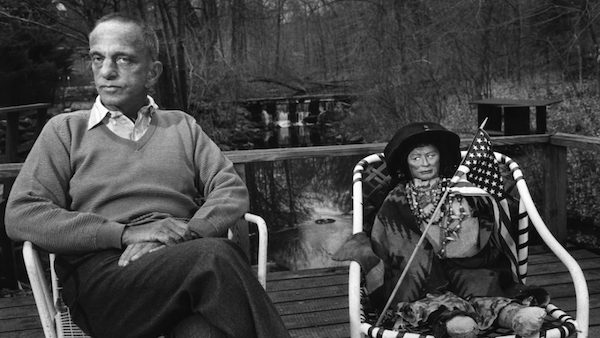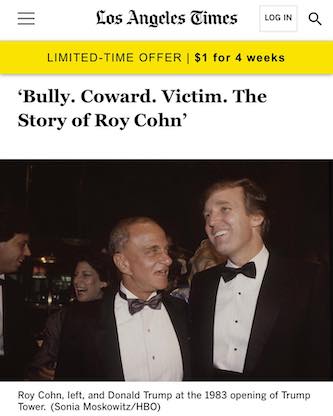Television Review: “Bully. Coward. Victim: The Story of Roy Cohn” — A Soulless Man
By Matt Hanson
Roy Cohn was much more pernicious than Joe McCarthy because he was far more adept at undercutting the relevance of so-called American values.

A scene from Bully. Coward. Victim: The Story of Roy Cohn. Photo: HBO Films
There’s a scene in Tony Kushner’s acclaimed play Angels in America where Lewis exclaims that Roy Cohn, the boss of the man he’s sleeping with, is “the polestar of human evil.” In the play, Lewis is a neurotic intellectual given to melodramatic overstatement. After watching the new HBO documentary Bully. Coward. Victim: The Story of Roy Cohn, you can’t help but feel that, for once, Lewis was being modest. Especially after Cohn’s own family members, as well as one of the man’s last interviewers, say the same exact thing. It’s one thing to be controversial, or to be known for being “hard-nosed.” But it’s something else entirely to be someone for whom nothing good could be said at all.
Roy Cohn made his name in the ’50s as a hotshot young lawyer from the Bronx who provided legal advice for the blustering fool Senator Joe McCarthy, who first set the blueprint for red-baiting and riling up the goon squad by denouncing so-called “Hollywood elitists,” whether there happened to be useful evidence to back up one’s assertions or not. I couldn’t help but emit a horse laugh when I heard an interviewee make the casual observation that “Joe McCarthy didn’t know anything about Communists.” If that rather pertinent fact had been made more publicly by more people at the time, who knows what grief might have been saved?
There’s a plausible case to be made that it is Cohn, not the ironically nicknamed “tail gunner Joe,” who was pushing the “red scare” hot buttons all along. Given Cohn’s apparent hatred of communism, enhanced by his pathological need to cozy up to the powerful, the “red hunt” offered this particular amoral careerist an irresistibly juicy opportunity to make a few friends in high places while he was taking the innocent down. His involvement in the Julius and Ethel Rosenberg case helped to further railroad the two suspected Communist spies to their state-sanctioned deaths. The documentary’s narration is provided by the Rosenbergs’ grandchildren who, in an interesting twist of fate, were adopted by Abel Meeropol. (The schoolteacher was the author of the Civil Rights anthem “Strange Fruit,” which has been lauded by some as the song of the century.) Their struggle to find posthumous justice is among the story lines that propel the documentary along.
And it turns out that the more we look into Roy Cohn’s beady little eyes the less we find any trace of a soul. After working for McCarthy, Cohn cultivated glitzy clients whose money and influence he gladly took advantage of, no matter how offensive their reputation. Definitive proof that Cohn left traces of his slimy legacy across our current political scene: he ended up glomming onto a then up-and-coming New York real estate mogul by the name of Donald Trump. He coached the young star about how to deal with the press — hit first, hit back, and either sue or threaten to sue anyone who gets in your way.
The usual rule of thumb with documentaries is that it must be kept in mind that the person being portrayed is human, for all his or her faults and quirks. And it’s usually a good rubric to follow. But Cohn’s life story becomes increasingly tawdry the more you look into it. He stiffed enormous bills at high-class places more out of spite than anything else; he cheated and lied and manipulated his way into every exclusive party he could find. He was a conspicuous presence around the gay enclave of Provincetown; he certainly went through his share of rent boys in the process.
Cohn’s homosexuality was evidently a major source of shame and embarrassment throughout his life. He overcompensated by repressing it and then letting it be known far and wide that he was the meanest kid on the block. Anyone who let his secret out of the closet was going to be in for some serious trouble. Rather pathetically, he denied his own HIV diagnosis — apparently up until his dying day. The film’s title comes from his memorial square on the AIDS quilt in Washington D.C., which was an amazingly sympathetic gesture on the part of a community that could have been easily forgiven for ignoring the man.
Along these lines, the film makes a major mistake by attempting to analyze Cohn’s pathology. The argument is that Cohn was the way he was because of his insecurities — economic, racial, sexual, and social. He tried his hardest to accumulate money and power because he was driven to fill the void within. This might be true in some ways — bottomless need certainly influenced Cohn’s ruthless, selfish, win-at-all-costs behavior. Ultimately, though, this lazy brand of pop psychology doesn’t excuse, or even really explain, why Cohn did all the amoral things he did for so many years.

Plenty of people grow up in more or less similar circumstances and they don’t all set out to ruin lives for a living. Insecurity about one’s standing in life has become a clichéd explanation for the lives of villains and monsters. It takes more than a chip on your shoulder to transform you into a sociopath. If a person knows he or she is doing the wrong thing, and it gives him or her pleasure, to the point of wanting to do it more often, then that’s as good a definition of evil as any.
There’s another scene in Angels in America (which is referenced in the film) in which Cohn is explaining his m.o. to his naïve young protégé. Cohn knows that he can get away with just about anything because he has something unique going for him: “Not ideology or sexual taste, but something much simpler: clout. Who owes me favors. Not who I fuck or who fucks me, but who will pick up the phone when I call…. This is not sophistry, and this is not hypocrisy. This is reality. I have sex with men, but unlike nearly every other man of which this is true, I bring the guy I’m screwing to Washington and President Reagan smiles at us and shakes his hand, because what I am is defined entirely by who I am.”
The above is a pithy description of the kind of institutional rottenness that Cohn was an exemplar of for decades What people are is defined by whom they know. His success indirectly explains why hoary American virtues like character and talent and courage crumble so easily in the face of power and double dealing and the willingness to be more vicious to get what you want than the other guy. In a charitable mood, one could say that Roy Cohn was a symptom of the way power really works in Washington and not the disease itself. But this would not only be factually wrong but rather naïve. Cohn was much more pernicious than Joe McCarthy because he was far more adept at undercutting the relevance of so-called American values. Unlike McCarthy, he could not only survive but thrive in the corridors of power — and his protégé could eventually become president.
It might sound like typical lefty umbrage, but the power brokers on the right often have nothing to do with the values that they espouse to keep the faithful voting early and often. The recent commutation of the sentence for Roger Stone’s lying to Congress about drawing on outside forces to win the election is only the most recent example. Will the conspiracy of silence that protects this kind of neon lit malfeasance be broken? I wouldn’t bet on it. In his later years, while dying of AIDS, Cohn brought one of his rent boys to a café in Provincetown to keep him entertained while he stewed in his misery. Everybody around them knew perfectly well who he was, and what was really going on — but nobody said a thing.
Matt Hanson is a contributing editor at the Arts Fuse whose work has also appeared in American Interest, Baffler, Guardian, Millions, New Yorker, Smart Set, and elsewhere. A longtime resident of Boston, he now lives in New Orleans.
Tagged: Bully. Coward. Victim: The Story of Roy Cohn, HBO, Matt Hanson, documentary
